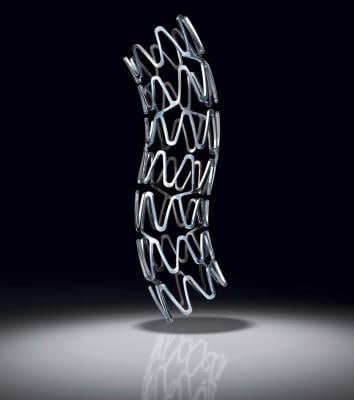
April 2, 2012 — Boston Scientific announced its support of the HORIZONS II AMI clinical trial, which is designed to evaluate the safety and efficacy of the Promus Element Plus everolimus-eluting platinum chromium (PtCr) coronary stent compared to the Omega platinum chromium bare-metal stent in patients experiencing an acute myocardial infarction (AMI). The trial is co-funded by Boston Scientific and The Medicines Company, and the Cardiovascular Research Foundation (CRF) will act as academic research organization (ARO). An overview of the trial design was presented at the American College of Cardiology’s 61st Annual Scientific Session by Gregg W. Stone, M.D., professor of medicine and director of research and education at the Center for Interventional Vascular Therapy at Columbia University Medical Center/New York-Presbyterian Hospital, and global principal investigator of the trial.
HORIZONS II AMI is a randomized, double-blind, superiority clinical trial that plans to enroll 7,000 to 10,000 patients at up to 400 sites worldwide, making it the largest randomized trial to study coronary stents in heart attack patients. The trial will compare the Promus Element stent to the Omega stent in patients undergoing primary percutaneous coronary intervention (PCI) for ST-segment elevation acute myocardial infarction (STEMI). All patients will be pre-treated with bivalirudin, aspirin and prasugrel, and then randomized to clopidogrel or prasugrel at 30 days post-procedure. The two primary clinical endpoints are target lesion revascularization (TLR) and stent thrombosis at 12 months. The study is designed to have sufficient power to demonstrate superiority for both endpoints. Clinical follow-up will occur at 30 days, six months and every 12 months out to three years. The non-inferiority pharmacology endpoint is death, MI, stroke, stent thrombosis or TIMI (thrombolysis in myocardial infarction) major/minor bleeding between one and 15 months. Patient enrollment in the trial is scheduled to begin late 2012. Data from the trial is expected to be used to support an expanded indication for the Promus Element stent for the treatment of STEMI patients.
"Heart attack patients are frequently treated with bare-metal stents, and remain at high risk for death and stent thrombosis despite successful percutaneous coronary angioplasty," said Stone. "As the largest primary PCI randomized trial ever performed in heart attack patients, HORIZONS II AMI is expected to provide essential guidance for physicians as to which stents and drugs will optimize outcomes following a heart attack."
The HORIZONS II AMI trial builds on results from the original HORIZONS AMI trial, which evaluated 3,006 patients randomized to receive either drug-eluting stents or bare-metal stents for the treatment of AMI. Data from that global trial were used to support U.S. Food and Drug Administration approval for an expanded indication to treat AMI patients with the Ion paclitaxel-eluting platinum chromium coronary stent system and the Taxus Liberte paclitaxel-eluting coronary stent system, which was received in February 2012. These devices are currently the only drug-eluting stent systems in the United States with an approved indication to treat patients with AMI.
"Boston Scientific continues to support large clinical trials that provide the medical community with data that can be used in combination with broader clinical judgment to develop optimal treatment strategies for challenging patient and lesion subsets," said Keith D. Dawkins, M.D., global chief medical officer for Boston Scientific. "We look forward to the results of this trial comparing the latest generation of drug-eluting and bare-metal stents on the advanced PtCr Element platform."
The safety and effectiveness of the Promus Element Plus stent system have not been established in patients with AMI. The Omega bare-metal stent system is an investigational device in the United States and is not available for sale.
For more information: www.bostonscientific.com.


 January 05, 2026
January 05, 2026 









